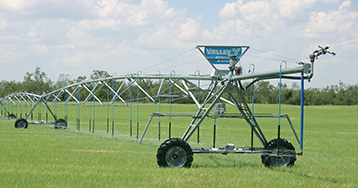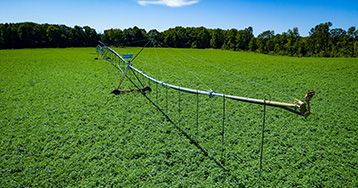
In the world of agriculture, efficient water management is paramount. For larger farms, center pivot irrigation has been the gold standard. However, when it comes to smaller fields, there's been a gap – until the advent of mini pivot irrigation. For growers managing smaller acreages and keen to understand how center-pivot technology can be tailored to their needs, this article delves into the world of mini pivot irrigation systems and how they can revolutionize irrigation for small farms.
Understanding Mini Pivot Irrigation Systems
At its core, mini pivot irrigation operates similarly to its larger counterpart, the standard center pivot system. Imagine a series of connected pipes mounted on wheeled towers, rotating around a central pivot point. This setup distributes water across the field in a circular pattern. Where mini pivots differ from regular center pivot irrigation systems is in their size and scale, tailored for smaller farms, typically those with less acreage than commercial mega-farms.
Why Opt for Small-Field Pivot Irrigation?
The unique design of mini center pivots makes them especially suited for small farms. Here's why:
1. Precision and Efficiency: With smaller diameters, mini center pivot irrigation systems can offer more precision in water distribution than non-mechanized alternatives. This means less water waste and more efficient irrigation, ensuring every part of the field gets the moisture it needs.
2. Flexibility: The scaled-down design of mini pivots allows for easy mobility. They can be moved from one field to another with minimal hassle, catering to diverse crop rotations and field layouts.
3. Reduced Labor and Costs: Automated systems mean fewer hands on deck. Growers can manage water distribution without the constant manual oversight required by some traditional irrigation methods.
4. Consistent Watering: Mini pivot irrigation systems ensure water is uniformly applied across the field. This reduces the risk of over-watering or under-watering, both of which can adversely impact crop yields.
Evaluating Water Usage for Mini Pivot Irrigation
 One of the concerns of any grower is the efficient use of water. Water is an invaluable resource, and its conservation is a matter of cost and environmental responsibility. So, how does water usage for mini pivot irrigation fare?
One of the concerns of any grower is the efficient use of water. Water is an invaluable resource, and its conservation is a matter of cost and environmental responsibility. So, how does water usage for mini pivot irrigation fare?
With the precise application, these systems can be calibrated to release just the right amount of water. Due to the uniform distribution and the ability to adjust to varying water needs of crops, mini pivot systems tend to use water more efficiently than flood or furrow irrigation methods. Additionally, with technological advancements, growers can incorporate soil moisture sensors and weather data into their irrigation strategy, ensuring that water usage is optimized for the current field conditions.
Comparing with Other Irrigation Systems for Small Farms
While mini pivot irrigation presents a compelling case, it's essential to understand how it stands in comparison to other irrigation methods tailored for small farms:
Drip Irrigation: Though highly efficient, drip systems can be labor-intensive to set up and maintain. They are also more susceptible to clogging and might only be suited for some crop types.
Sprinkler Systems: While these can be tailored for smaller fields, they often offer a different level of overall distribution uniformity than mini center pivot irrigation systems.
Surface or Flood Irrigation: This older method can lead to significant water waste and is less efficient in water distribution. Moreover, it might not be ideal for certain soil types.
In Conclusion
Mini pivot irrigation systems present a compelling solution for growers with small farms looking to optimize their irrigation. They marry the benefits of center pivot technology with the unique needs of smaller fields, ensuring efficient water usage, reduced labor, and consistent watering. As with any agricultural practice, weighing the pros and cons and understanding the specific needs of your farm and crops is essential. However, for many, mini center pivot irrigation systems will likely be a game-changing addition to their farming toolkit.

